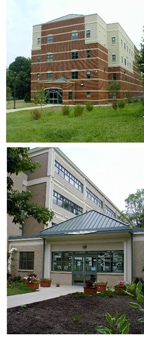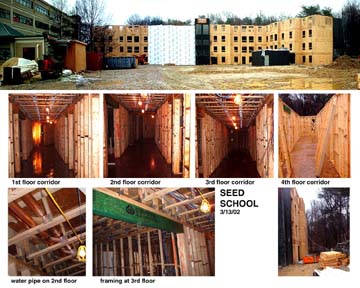|
Web
Exclusives:Features
Nurturing
Success Rajiv Vinnakota '93 is not afraid to blaze new trails, even if it means leaving a comfortable management consulting job for the nonprofit, education sector. Vinnakota has spent the last four years developing the country's first urban public charter boarding school from the ground up in southeast Washington, D.C. The school currently feeds, beds, and educates 155 students in seventh to 10th grades in one of the nation's most underserved communities. The SEED Public Charter School is a subsidiary of the Schools for Educational Evolution and Development, which was conceived from discussions on urban policy and education that Vinnakota had with classmates at his first reunion in 1994. "We serve them in their own environment — not the Pennsylvania boonies or Colorado — and it demonstrates to them that good things can happen in their community," said Vinnakota. It was not easy, though. The molecular biology major who also earned a certificate from the Woodrow Wilson School put his policy knowledge to work during those development years. He successfully lobbied for an amendment — which he authored — to Washington, D.C.'s charter school law that increased spending for the boarding school, which required more resources because of its 24-hour operations. The investment has already produced returns with standardized test scores from the school's first class improving every year. "It show that if you provide the necessary resources for our kids they can succeed beyond your wildest dreams," says Vinnakota, who focuses his energy nowadays on administrative tasks such as strategizing and fundraising. The school has received much attention in the Beltway, with articles regaling its efforts appearing in all local newspapers, including Roll Call. "They are able to bring all kinds of new investments — financial, personal, and even political — into the lives of these young people," Nelson Smith, the executive director of the D.C. Public Charter Schools Board told Roll Call. "They really break the boundaries." Vinnakota's goals for SEED's students are long term. "I'll
tell you it's working when I graduate our first group of kids from
college," Vinnakota says. To learn more about the SEED Foundation and charter school, visit them at http://www.seedfoundation.com/ . By Argelio Dumenigo You can reach Argelio at dumenigo@princeton.edu
|


 April
10, 2002:
April
10, 2002: After
that weekend, the Milwaukee native took a leave of absence from
his job at Mercer Management Consultant and started researching
boarding schools. By February 1998, Vinnakota and fellow cofounder
Eric Adler were welcoming SEED's first 40 students to the school's
original home, a renovated residential hall classrooms on the grounds
of the Capital Children's Museum.
After
that weekend, the Milwaukee native took a leave of absence from
his job at Mercer Management Consultant and started researching
boarding schools. By February 1998, Vinnakota and fellow cofounder
Eric Adler were welcoming SEED's first 40 students to the school's
original home, a renovated residential hall classrooms on the grounds
of the Capital Children's Museum.
 The
school, now located in a newly constructed campus that will serve
300 students when completed, receives about $23,000 per student.
SEED makes up the rest of its annual $28,000 per student cost through
fundraising and time/dollar contributions from parents, who do various
jobs such as cleaning, supervising, and carpooling for home visits.
The
school, now located in a newly constructed campus that will serve
300 students when completed, receives about $23,000 per student.
SEED makes up the rest of its annual $28,000 per student cost through
fundraising and time/dollar contributions from parents, who do various
jobs such as cleaning, supervising, and carpooling for home visits.